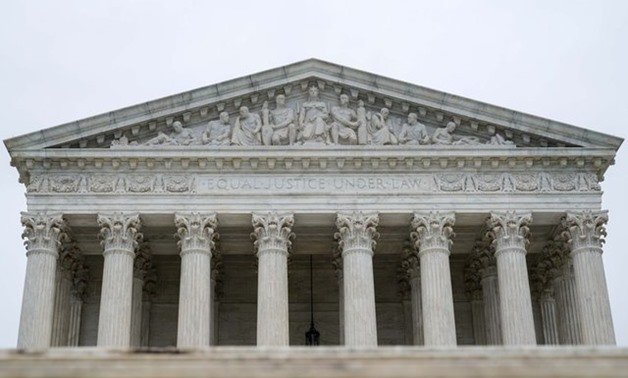
U.S. top court throws out Minnesota ban on voter political apparel - FILE
WASHINGTON - 14 June 2018: States cannot impose a blanket prohibition on apparel such as T-shirts and buttons bearing political messages in polling sites, the U.S. Supreme Court said on Thursday in an important free speech ruling striking down a Minnesota law as unconstitutional.
The court, in the 7-2 ruling, said Minnesota's law, which dates back to 1912, went too far in banning voters from wearing political apparel but left room for states to craft some sort of limits on what should be allowed in polling places and what should not.
Minnesota's law barred people from wearing clothing, badges, buttons or other insignia with overtly political messages inside polling places during primary or general elections. Violators were asked to cover up or remove offending items, but officials were instructed not to bar anyone from voting.
The Supreme Court endorsed the argument advanced by the conservative activists who challenged Minnesota's law, finding that it ran afoul of the U.S. Constitution's First Amendment guarantee of freedom of speech.
Writing for the majority, Chief Justice John Roberts said Minnesota's said Minnesota's law did not define the term "political" and could be haphazardly enforced. He wondered in the ruling whether a "Support Our Troops" shirt could be banned, or one displaying "#MeToo," referring to a movement encouraging women to share their experiences of abuse.
While Minnesota has tried to promote voting "in a setting removed from the clamor and din of electioneering," Roberts wrote, the state "has not supported its good intentions with a law capable of reasoned application."
Still, Roberts said, states can prohibit certain apparel at the voting place to avoid the partisan discord that can be associated with an election. "Members of the public are brought together at that place, at the end of what may have been an divisive election season, to reach considered decisions about their government and laws," Robert added.
Roberts was joined by the other four conservatives on the court as well as liberal justices Ruth Bader Ginsburg and Elena Kagan.
'ARBITERS OF FREE SPEECH'
"The Supreme Court today vindicated the constitutional protections of every American," said attorney David Breemer of the Pacific Legal Foundation, a conservative legal advocacy group that represented the law's challengers. "The court put all government entities on notice - they cannot dictate the terms of personal expression, nor can they designate the arbiters of free speech at their whim."
Delaware, Kansas, Montana, New Jersey, New York, Tennessee, Texas, Vermont and South Carolina impose restrictions similar to Minnesota's.
The justices issued the ruling against a backdrop of deepening political polarization in America.
In another major ruling involving free speech at polling sites, the high court in 1992 upheld a Tennessee law barring the solicitation of votes and the display or distribution of campaign material within 100 feet (30 meters) of a polling place.
One of the conservative activists who challenged the law, Andy Cilek of the St. Paul-based Minnesota Voters Alliance, was stopped by a poll worker when he showed up on Election Day in 2010 wearing a T-shirt touting the conservative Tea Party movement with the words "Don't Tread on Me" as well as a button stating, "Please I.D. Me." Cilek eventually was allowed to vote.
Cilek and the others who sued in 2010 to overturn the law said wearing political apparel is an inherently peaceful form of expression. Minnesota said the law is applied neutrally and helps prevent confusion or intimidation during voting.
Minnesota has said it had no record of anyone ever being prosecuted under the law.
Justice Sonia Sotomayor, in a dissent joined by fellow liberal Justice Stephen Breyer, said the case should have been referred to Minnesota's Supreme Court to interpret the state's law before it was declared unconstitutional.
The St. Louis-based 8th U.S. Circuit Court of Appeals upheld the Minnesota restrictions in 2013 and 2017.

Comments
Leave a Comment